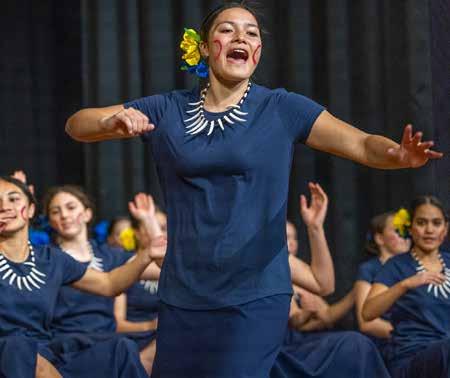
7 minute read
Year 11 Student writing hits the Dom Post
The writing of two Year 11 Students, Tia Pavihi and Sarah Caddis, was published in the Dominion Post in Term 3. Their messages are inspirational, powerful and were also delivered orally in the Senior School Speech Competition to an audience of judges and their peers.
Plastic
By Tia Pavihi
You’re not Samoan enough: you don’t speak Samoan, you’re fiapalagi, you’re afakasi (halfcaste), you don’t go to church, you’re plastic!
Despite my dad being of Samoan descent, many Samoans only focus on my palagi (NZ European) heritage from my mum. I am constantly told I am not Samoan enough due to things I have no control over. It’s true that I don’t speak Samoan, I don’t regularly go to church, and I am not often found in a puletasi (traditional dress). However, I still have a strong passion and connection for my Samoan culture. Yet I am continually called plastic.
So… what does plastic mean? The derogatory term “plastic” refers to a person who is out of touch with their culture and perhaps doesn’t understand or speak the language. What does plastic mean to me? Barbie dolls, pollution and waste. I reject the term plastic and challenge this one-dimensional view of culture.
Growing up I struggled to fit in I’ve either been “too white” for the brown kids but then “too brown” for the white kids. I live in these two different worlds. I’ve found it hard to be able to express my passion for my Samoan culture because when I do, I am put down, shamed and called plastic by people of my own culture for merely being myself. Since a young age I’ve always been told “You’re ONLY half” like half isn’t enough, like it doesn’t make me worthy of being a Samoan. What our own people don’t understand is the impact the use of this word has on OUR development, OUR people and the future of OUR culture. The poet John Agard ridicules the concept of being half-caste by joking “when you mix a black key with a white key, it’s a half-caste
symphony”. Well, I’ll tell you one thing, I am not a fraction. I’ve grown up identifying as a Kiwi/Samoan. I am 15 years old now and not fluent in Samoan, but I know some words from speaking with my dad and being out in the wider community. There was a time when I was questioned if I knew how to speak Samoan and received a judgemental look after my response which left me feeling embarrassed like I was less than. Why do my own people do this to me? Why am I different? Am I not Samoan enough?
The stereotype of a “real Samoan” in NZ is they are Christians who attend Church, immersed in the language at home and always provide for their family. My upbringing as a

Kiwi-Samoan has been different. This hasn’t been the case. But being Samoan means more than speaking the language, it's full of stories, traditions and narratives that have been passed down from generation to generation. We act like Samoan culture isn’t more than a language.
To some Samoans being “palagi” is associated with being bratty, spoilt, ungrateful and privileged. This is largely due to the rocky history of Pasifika people in Aotearoa. The stereotype of being white seem to go against Fa’a Samoa, the real Samoan way. To me my palagi side represents generosity, support, love and a really good sense of humour, just like my Samoan side.
What I would like other Samoans to appreciate is that though my two sides of my family may vary in ethnicity, skin colour, hair colour and more, they have both greatly contributed to making me who me the Kiwi-Samoan I am today. The word PLASTIC is breaking us apart. If this continues there won’t be any Samoans driven to pass down the knowledge and values that came before us. What classifies me as a Samoan is my pride, heart and willingness to learn. When I grow up, I want to be able to tell my kids the stories of their Samoan heritage and give them the ability to express themselves and their Kiwi/ Samoan heritage. As Samoans we have to learn to accept the new generations to come as they are the ones who will be fighting for our culture in the future. No matter the fraction, no Samoan is more worthy than another. Fractions are JUST a number. Don’t let anyone “confirm” your spot in your culture.
“I am not plastic. I am a proud
Kiwi-Samoan! O lo'u igoa o Tia Pavihi O a'u o le Samoa

The Killer Amongst Us
By Sarah Caddis
A serial killer on a murdering spree, and no one’s doing anything about it.
One woman dies every 48 hours in New Zealand from the least survivable cancer, ovarian. More people die from ovarian cancer in New Zealand than those who die from car crashes. In fact, the government hands out $1 Billion dollars annually to reduce this road toll, yet nothing is done to protect the women of New Zealand from their most dangerous killer.
Ovarian cancer only affects women as the ovaries are part of the female reproductive system. This disease has no gender bias. It does not discriminate against women, so why is there no voice nor actions to help the Wāhine of New Zealand prevent it?
In 1806, Jane Crawford had a tumour removed from her abdomen, this was the first discovery of ovarian cancer. Whereas cancer like testicular which only affects men was discovered in the 1960s, over 150 years after ovarian cancer was documented. Yet an ad, which you may have seen recently, features some rugby stars from the All Blacks wearing Jockey underwear raising awareness to testicular cancer and getting tested. Ovarian cancer has been known for over 200 years, yet still, no tests or voices are talking about this killer taking one of our Wāhine every 48 hours.
Symptoms of ovarian cancer consist of abdominal bloating or swelling, quickly feeling full when eating, discomfort in the pelvis area such as severe cramps, changes in bowel habits, such as constipation, a frequent need to urinate and a loss of energy and feeling tired all the time. Such symptoms most woman may recognise as being very similar to those of a severe period. Society tells women; “periods are gross” “No one wants to hear about menstruation” “are you on your period?” “It's someone’s time of the month.” With such mocking and degrading comments, it is no wonder why women feel ashamed to talk about period-like symptoms with others. Regardless, even if a woman chose to speak about these painful symptoms, there still is no way to test for ovarian cancer and even still if they chose to speak with a medical professional, it is more than likely they will get misdiagnosed, like Amy Meyer.
Amy Meyer was a 36-year-old Aucklander, who went to the hospital when she started feeling severe abdominal pains. The doctor said her symptoms matched those of chlamydia so gave a swab test and prescribed Amy some antibiotics. A few months later, she passed away, cause of death, ovarian cancer. The health system is sexist, it is more of a fact than a statement. In New Zealand, women dominate the health industry with almost four times more women in healthcare than men. Yet, in such a female leading business, men are paid almost $10 more per hour in healthcare jobs than females doing the same work. The sexism in the health industry does not just stop at a pay gap. These issues carry on into the lack of research and funding women receive for diseases that only affect them, such as ovarian cancer.
Now, you may argue that "Women suffer from breast cancer and don't they get a lot of advertising and research behind that?"
Yes, you would be correct, but unlike ovarian cancer, breast cancer can affect men too. Although men do not have breasts like a female, they too have breast tissue which can become cancerous. It would be absolutely sexist to deny a man research and vocalization of a deadly disease that only affects him because of his gender, yet why is this happening to women?
It is time to break the silence on ovarian cancer. It can happen to any woman at any time regardless of her age. There is no screening tool or test for ovarian cancer, the only way we can prevent the rates of mortality is by talking. Its time to push aside the voices telling women to be quiet about period like symptoms, because by talking about them, we may be able to prevent healthy woman like Amy Meyer passing away too soon.
“A serial killer is on a murdering spree, and it’s time we talk about it.










